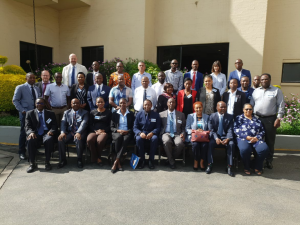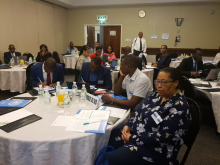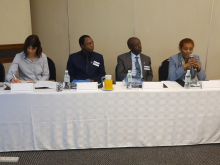Zimbabwe hosts a second regional meeting on the quest to develop non-chemical-based vector control interventions for malaria
Zimbabwe successfully hosted the 2nd Annual Afro II Project Regional Coordination and Steering Committee from 10-12 April 2019 in Harare. The main objective of the meeting was to assess the participating countries` progress towards the implementation of the planned project activities for the period 2018-2019. The 1st Annual Afro II Project Regional Coordination and Steering Committee meeting was held in Eswatini, in April 2018.
Zimbabwe is one of the six SADCC countries that were selected to participate in a project expected to demonstrate the effectiveness of diversified, environmentally sound and sustainable interventions for use in the fight against malaria. This project could not have come at a more opportune moment, taking into consideration that malaria is the third leading cause of morbidity and mortality in Zimbabwe, and the country is among the Southern African nations on the World Health Organization (WHO)’s list of African countries expected to eliminate malaria by the year 2030.
Welcoming the delegates to the aforementioned meeting in Harare, World Health Organization, (WHO) Country Representative, Dr. Alex Gasasira emphasized the necessity of increasing vector control interventions in a bid to intensify the war against vector borne diseases such as malaria, in the Africa region.
He lamented that countries in the region had so far been relying on two major vector control interventions, indoor residual spraying (IRS) with insecticides and the use of long life insecticide treated nets (LLINs) for malaria control.
Dr. Gibson Mhlanga, Principal Medical Director in the Zimbabwe Ministry of Health and Child Care graced the occasion by officially opened the meeting on behalf of the Permanent Secretary of the ministry. He expressed concern that countries still relied on insecticides-based interventions in malaria vector control despite public health and environmental concerns, primarily because of lack of proven cost-effective alternatives. His greatest hope was that the Afro II Project would provide the necessary evidence for the incorporation of non-chemical-based malaria vector control interventions into the current responses to malaria. Dr. Mhlanga also stressed the need to continue using other complementary strategies like case management, surveillance, monitoring and evaluation, social and behaviour change communication to combat malaria.
The main outcome of the meeting was the development of accelerated implementation plans for 2019-2020 by project countries. Gaps and challenges were also identified, and appropriate actions were proposed and adopted to overcome these and expedite implementation.
The Afro II Project is a Ministry of Health and Child Care project that is funded by Global Environment Facility (GEF) through the United Nations Environment Programme (UNEP). WHO provides technical support as the executing agency. The project is directed at generating evidence on the effectiveness of potential alternative vector control interventions that are non-chemical based. This is part of efforts to diversify the malaria control strategies by increasing the options of interventions that will strengthen the effectiveness of the malaria control programs in the region.





